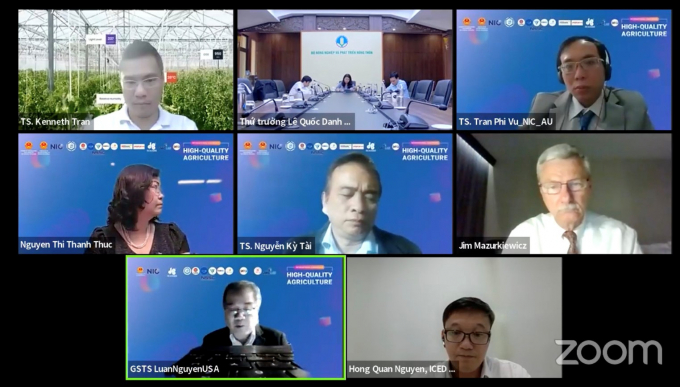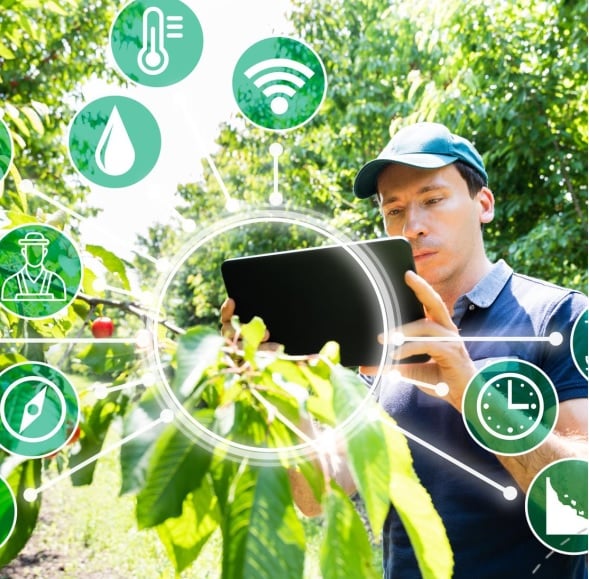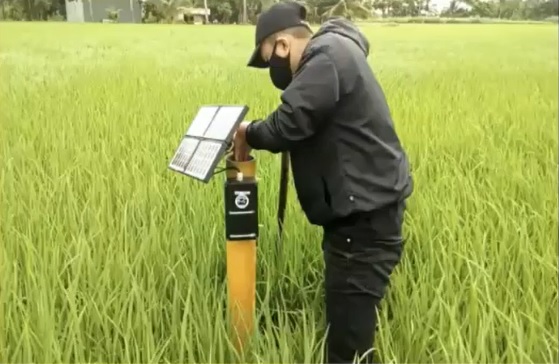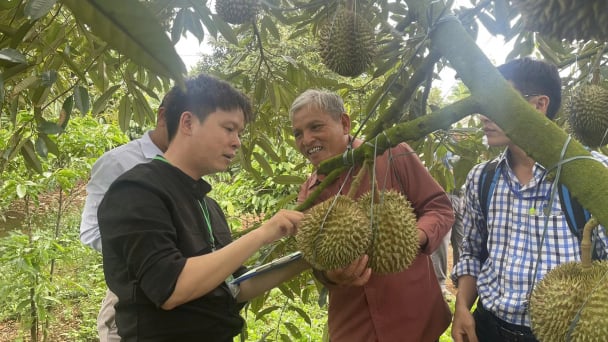June 1, 2025 | 03:47 GMT +7
June 1, 2025 | 03:47 GMT +7
Hotline: 0913.378.918
June 1, 2025 | 03:47 GMT +7
Hotline: 0913.378.918
Prof. Dr. Nguyen Duy Luan, CEO and President of UZip, Associate Professor at the McCombs School of Business - the University of Texas at Austin, Huston- Tillotson University (the United States), addressed the global agriculture landscape at Theme 2 of the International Conference on High-Quality Agriculture Vietnam 2022 on May 29.
Statistics indicate that worldwide yield has been declining over time. As many as 820 million people are now facing food shortages. The number would increase to between 1.5 and 2 billion by 2032 and between 3 and 3.5 billion by 2045. While the global food system is facing a number of challenges, such as geo-political variations from the Russia-Ukraine conflicts and the uncertainty of the Covid-19 pandemic, the rapid rise of the Asian population, and the reduction of the agricultural land area due to climate change, agricultural yield and quality are declining.
Adoption of new technology and techniques at all levels of agricultural production and distribution is essential for the development of sustainable and productive agriculture. Regarding the technology in agriculture, in addition to the capacity in telecommunications and data links, Vietnam should place a great deal of emphasis on influencing factors such as the development of the real estate industry and climate change, which have been reducing the efficiency of progress in saving agricultural production land and reducing agricultural resources and labor resources.

Vietnam is in a position of good climate, good soil, and young workers, so according to Prof. Dr. Luan, the risk of global food shortage can also be an opportunity for Vietnamese agriculture to exploit.
Prof. Dr. Luan asserted that investments in agriculture 4.0 or (AGTECH) are altering the agricultural value chain based on the "Industry 5.0" idea. The blockchain, Internet of Things (IoT), and artificial intelligence (AI) are fields of extensive study throughout the world that Vietnam should link to in order to implement them effectively in its domestic agriculture. The implementation of Industry 5.0 will help introduce a fair business model to Vietnamese agriculture and the worldwide agricultural chain, increase the efficiency of the global food demand-supply chain, and contribute to the settlement of the food shortage crisis.
Prof. Dr. Luan also proposed at the conference the establishment of a digital community system capable of promoting the transformation, creative methods, interactive and high-effective, promoting the care and distribution of agricultural products in the direction of a more cohesive manner, preserving agricultural products and truly enhancing the quality of life for all individuals in the agricultural production chain, from farmers to consumers of agricultural products.

Vietnam needs to build an agricultural center that facilitates the appropriate application of new technologies and advanced solutions that the world is applying.
AgriDAO Vietnam is an organization formed through the cooperation of Vietnamese consumers of agricultural products, farmers, domestic and foreign experts, ministries, departments, and universities, as well as institutes and innovation centers, businesses utilizing agricultural supply chain technology, investment funds, and banks, and Vietnamese agricultural associations and organizations.
"AgriDAO (Decentralized autonomous organization) utilizes blockchain technology, NFT, Web 3.0, and Metaverse, with a concentration on farmers and agricultural goods. The DAO members assist in establishing the ground rules, following which the agreed-upon decisions are implemented. Proposals and votes, as well as the code itself, maybe publicly audited at any moment using mathematical methods and with little human or third-party intermediaries, resulting in more transparency and efficiency than existing systems", Prof. Dr. Luan has presented the approach.
Prof. Dr. Nguyen Duy Luan proposed three strategies for Vietnam to take the lead in adopting industry 5.0 for sustainable and circular agriculture development: "The short-term strategy in one year will focus on the "borrowing" "of domestic and international concepts, technologies, human knowledge, and ecosystem sources. Vietnam would implement a three-year strategy to expand its recognition, visibility, and market share on the international stage. Over the course of the next five years, Vietnam will be at the forefront of technology and trends, leading to a growth in agricultural product revenues and profits ".
With the theme "Application of technology 5.0 to innovate sustainable development of the agricultural industry and supply chain to improve the quality, distribution, and value of agricultural products in an effective and circular manner", Dr. Pham Vu Bang, Deputy Director of International Cooperation and Project Promotion Department - Tra Vinh University, presented on the project "Piloting adoption of the automatic sensor to increase the efficiency of water use in rice cultivation."

This is one of the efforts to apply smart technology in farming to reduce greenhouse gas emissions or look beyond, to help the rice industry develop sustainably in the face of climate change.
The alternating dry-wet irrigation system (shortened to AWD) has been established as a method for maximizing water use in rice farming. Several studies have demonstrated that this technique can cut water usage by as much as 30 percent compared to conventional methods.
Compared to using a pump, the AWD irrigation system reduces production costs by decreasing input and energy consumption. The adoption of AWD technology and irrigation systems may greatly cut greenhouse gas emissions, according to Dr. Bang.
During the pilot implementation and World Bank proposals, the research team hypothesized the creation of an autonomous water-measuring sensor system. Accurate data will enable farmers to confidently grow crops, and small farming households will find the system easier to implement.
In two years of execution, the project yielded a number of favorable results. The initiative cooperated with 82 farmers on a cultivation area of around 70 hectares, demonstrating for the first time that small farming households were able to apply the Internet of Things to boost water usage efficiency in agriculture. The smart AWD pipe will help farmers save an additional 13 to 20 percent of water and 25 percent of irrigating costs compared to the conventional AWD pipe. The use of IoT to analyze cultivation data contributes to a significant rise in production, and the field's emission reduction efficiency is 30 percent more than that of the AWD system before it was modified.
Translated by Dieu Linh

(VAN) For the durian industry to succeed, the value chain must fulfill its commitments to the government, the community, and international partners.

(VAN) Vaccinating juvenile pangasius helps reduce disease, antibiotic use, and farming costs, increasing profits for export-oriented farmers in An Giang.

(VAN) Due to a limited supply of workforce and competitive recruitment requirements, businesses struggle to retain talented veterinary human resources.

(VAN) WOAH’s guidance aims to mitigate disease risks through a One Health approach that balances economic, conservation, and public health interests.

(VAN) Ms. Nguyen Thi Dung, Deputy Director of Ngoc Hoang Cooperative, shared about the journey of bringing dragon fruit to Europe, achieving annual revenues in the billions of VND.

(VAN) Bamboo products from Thang Tho Bamboo Cooperative have reached many countries around the world, while also creating jobs for local workers.

(VAN) The Management Board of Con Dao National Park reported that a green sea turtle, tagged in the Philippines, has traveled thousands of kilometers to lay 84 eggs on Bay Canh Islet.